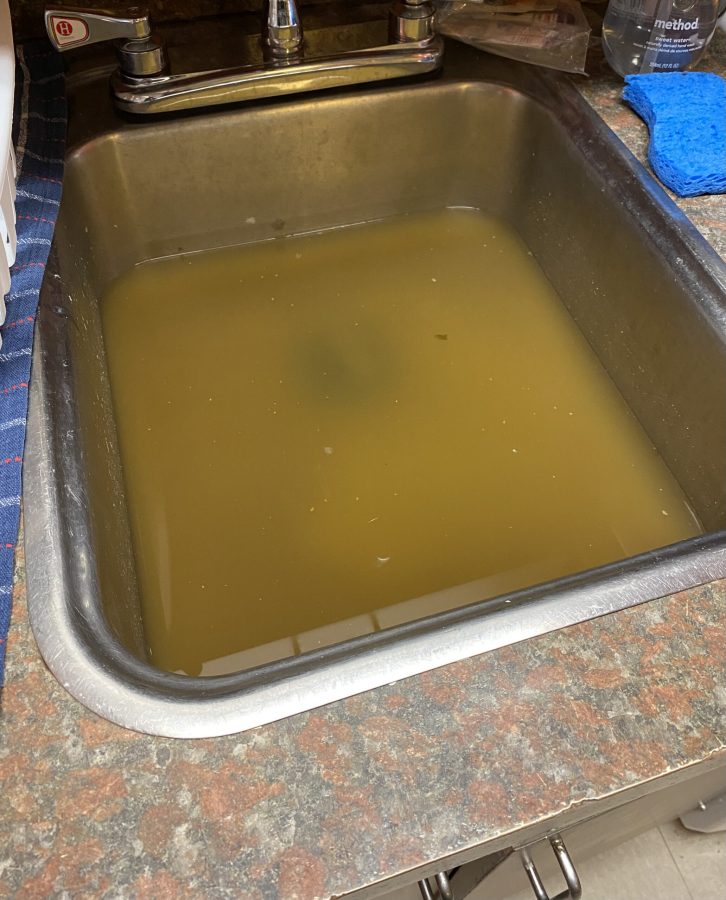Martin Ssessanga ’21 was leaving for soccer practice on a Saturday afternoon when he noticed something shocking in his kitchen: murky brown water rising out of his sink and spilling out onto the floor.
Ssessanga and his roommate Hale Lombard ’23 tried turning on the garbage disposal to bring the water level down. But the sink filled right back up.
They rushed to move their microwave and coffee maker off the counter, then started bailing the water out using trash cans and plastic tubs from their kitchen, dumping it outside of their suite in the Watson Courts.
“The water was super murky and brown,” Lombard said. “Nothing you’d want to be touching.”
Two days later, their sink backed up again with sewage. This time, the college sent a plumber to investigate the issue. And for two weeks after, Ssessanga and Lombard’s sink stayed waste-free.
Around the same time, many other residents in the Watson Courts were experiencing similar issues with sewage backups in their kitchens. Olivia Newman ’22 and her roommates, who live in the Courts, also tried the garbage bin strategy for bailing out the water when their sink started overflowing.
“A lot of it was all over the counter and on the floor but we got…a good amount of it into the bin,” Newman said. “It smelled really bad.”
Then came the most serious incident to date. On March 8, just a few weeks after Ssessanga’s first backup, all four of the suites in Watson Court B experienced a severe sewage backup that led to wastewater filling up their sinks. While the issue was being fixed, the 12 affected students were asked to relocate to different housing assigned by the college for “at least four days.”
The problem was a broken sewage line outside the court. With the wastewater from the court unable to drain properly out of the residences, it came back up inside, filling the sinks instead. In order to replace the pipe, the water needed to be turned off in the residences and plumbers needed to be in and out of the suites, which was why the students were relocated.
All the students have since returned to their dorms after being notified last Friday by Assistant Director of Residence Life Terrence Haynes that the problem had been resolved.
Prior to the burst pipe, the backups were caused by clogs, which may have also caused the pipe to finally burst when it did, according to Director of Facilities Operations Scott Kennedy.
“When our plumbers clear these backups or breaks, they find out what causes it. And there’s been an excessive amount of paper towels, wipes and food in the sanitary lines,” he said.
This year, there have been more clogs than ever before, he added, with the number up nearly 20% from previous years. The COVID-19 pandemic and the new living styles it has imposed has certainly played a role in this uptick, he said.
“A lot of students are eating in the rooms with the grab-and-go meals,” he said. “So there’s more food, but food that is going down the kitchen sink [rather than] into the trash.”
As to why the most severe backups were concentrated in the Watson Courts, Kennedy said that housing with kitchens often has more clogs because this typically means more food waste goes down the sink. He added that paper towels and wipes, including disposable wipes, going down the toilet also contribute to the problem.
“We like to clean certain [pipe] lines more proactively, but the biggest factor is occupant education about, ‘please don’t put these things in the toilet,’” said Vice President of Finance and Administration Roger Demareski, who oversees the Facilities division.
Most of the students affected by the pipe burst told The Lafayette that they were mostly satisfied with how quickly the college handled the situation. However, a few students noted that a lack of information from the college added more stress to an already serious situation.
Grace Ragosa ‘22 and her roommate Taylor Strong ‘22 both said they were not kept “in the loop” leading up to and following when they were displaced from their residence.
“The only time we would actually find out that people were doing work on our pipes is either when we hear them outside, cursing or doing the work on the actual pipes themselves, or when finally Terrence Haynes knocked on our door and said that we had to leave,” Strong said.
“They took us from our place of comfort and…safety and relocated us…and there was no written proof [that anything was being fixed],” Ragosa added.
“We didn’t even know how long it was going to take, so here we are in this bare house with only some of our stuff trying to make life as normal as possible, not knowing how long it’s going to take and hearing from our friends everyday who live in the court saying that nothing was done.”
Kennedy said that if students notice a backup, they should immediately contact their Resident Advisor. Most clogs can be handled within a few hours and the team will sanitize the area when they have finished.
And to prevent the backups, he said, follow one simple rule: only human waste and toilet paper should go down the toilet.
Managing Editor Andrew Hollander ’21 contributed reporting.




































































































